
Exposure Therapy in Virtual Reality
Virtual reality technology has created a possibility for entirely new types of therapy. An interesting angle psychology researchers have been exploring for the past several years is how people’s experiences in virtual reality can change their attitudes and behaviors in actual reality.
Research on this theme has suggested, for example, that experiences in virtual reality can make people less afraid of death or enhance their creativity. It has even raised the possibility that having virtual reality near-death experiences can alter people’s priorities, such as by making them less materialistic.
A different use of virtual reality that’s increasingly gaining attention is as a medium for exposure therapy.
Exposure therapy itself is a method of treating anxiety disorders and phobias that far predates virtual reality. In exposure therapy, people work with therapists to confront and acclimate themselves to situations they have a strong aversion to.
What’s new is the idea that exposure to fears can take place in virtual reality.
A recent paper gives an example of how virtual reality exposure therapy might work, focusing on people with a phobia of spiders. The researchers attempted to “gamify” exposure therapy, turning it into a virtual reality game.
In the game, people progressed through levels with increasingly challenging tasks such as looking at a spider, protecting a spider from objects flying toward it, or approaching a spider. As the levels increased in difficulty, the spiders became more lifelike too, changing from a cartoon spider to a realistic black widow.
People with spider phobias who tried the game reported both positive and negative aspects of the experience, but many found it helpful overall. According to the authors, the virtual reality game tended to be seen “not as psychotherapy devoid of a therapist but rather as a serious game with a psychotherapeutic goal.”
More generally, previous research has suggested promise to virtual reality exposure therapy.
One study that tested virtual reality exposure therapy as a treatment for social anxiety found that improvements in people’s symptoms were still noticeable a year later. A 2019 meta-analysis of previous studies came to the conclusion not only that virtual reality exposure therapy can make a difference for people with anxiety disorders but that it may in fact be as effective as traditional exposure therapy.
As in the case of online mental health interventions, virtual reality therapies are an area where there are probably plenty of innovations that have yet to be made. So far, the research is suggesting that virtual reality opens the door to the possibility of delivering traditional therapies in new ways, or coming up with new therapies entirely!